
POLYMER SCIENCE SERIES C
Scope & Guideline
Advancing the Frontiers of Polymer Research
Introduction
Aims and Scopes
- Polymer Synthesis and Modification:
The journal extensively publishes studies related to the synthesis of novel polymers and the modification of existing polymers to enhance their properties and functionalities. - Nanocomposites and Advanced Materials:
There is a strong emphasis on the development of nanocomposite materials, which incorporate nanoscale fillers to improve the mechanical, thermal, and electrical properties of polymers. - Sustainable Polymer Technologies:
Research on biodegradable polymers and the use of renewable resources in polymer production is a key focus, highlighting the journal's commitment to sustainability. - Functional Polymers and Applications:
The journal explores the synthesis and application of functional polymers, including those with specific properties for use in electronics, biomedical applications, and environmental protection. - Polymer Characterization and Theoretical Studies:
Papers often include detailed studies on the characterization of polymer structures and properties, as well as theoretical approaches to understand polymer behavior.
Trending and Emerging
- Self-Healing Polymers:
The emergence of self-healing polymer systems, particularly those utilizing natural raw materials, indicates a growing interest in materials that can repair themselves, enhancing longevity and sustainability. - Nanostructured Materials and Composites:
The focus on nanostructured materials, including cellulose and carbon nanofillers, underscores the trend towards enhancing material performance through nanoscale engineering. - Mechanochemistry in Polymer Science:
The increasing attention to mechanochemical processes for polymer synthesis and modification highlights a novel approach that combines mechanical force with chemical reactions, opening new avenues for material development. - Sustainable and Biodegradable Polymers:
There is a significant rise in research focused on sustainable polymers, particularly in the context of environmental impact and the use of renewable resources, reflecting global concerns about plastic waste. - Stimuli-Responsive Polymers:
The development of stimuli-responsive systems showcases the trend towards smart materials that can respond to environmental changes, which is relevant for applications in drug delivery and adaptive materials.
Declining or Waning
- Traditional Polymer Processing Techniques:
There has been a noticeable decrease in papers focusing on conventional polymer processing methods, suggesting a shift towards more innovative and sustainable techniques. - General Polymer Chemistry:
Research papers that deal with broad aspects of polymer chemistry without a specific application or advanced modification are becoming less frequent, indicating a trend towards more specialized and application-oriented studies. - Inorganic-Polymer Hybrid Materials:
The focus on inorganic-polymer hybrid materials has waned, possibly due to a growing interest in purely organic or bio-based polymers that align with sustainability goals.
Similar Journals

POLYMER BULLETIN
Elevating Standards in Polymer Science and TechnologyPOLYMER BULLETIN is a prominent journal in the field of polymer science, published by SPRINGER in Germany. Established in 1978, this peer-reviewed journal focuses on the latest research and developments in polymer chemistry, materials science, and condensed matter physics, boasting a commendable impact factor indicative of its rigorous academic standards. With a Q2 ranking in multiple categories including Chemistry (Miscellaneous), Condensed Matter Physics, Materials Chemistry, and Polymers and Plastics, POLYMER BULLETIN serves as an essential resource for researchers, professionals, and students aiming to stay abreast of innovative findings and methodologies within these interdisciplinary landscapes. Although the journal does not currently offer open access, it provides invaluable insights and data that significantly contribute to the advancement of polymer science. For more information and to access published articles, visit the journal's page on the Springer website.

IRANIAN POLYMER JOURNAL
Exploring New Dimensions in Materials ChemistryWelcome to the Iranian Polymer Journal, an esteemed publication encompassing a rich history since its inception in 1996 and extending its scholarly reach up to 2024. Published by Springer from Switzerland, this journal stands out in the fields of Chemical Engineering, Materials Chemistry, and Polymers and Plastics, proudly holding a Q2 category ranking in each of these disciplines for 2023. With an ISSN of 1026-1265 and an E-ISSN of 1735-5265, the journal serves as a vital resource for researchers, professionals, and students, offering insights into polymer science and interdisciplinary applications. Although not an open-access journal, it presents an invaluable platform for high-quality research dissemination and robust peer-reviewed articles. With Scopus rankings indicating its respected position within the academic community, the Iranian Polymer Journal is committed to advancing knowledge and fostering innovation in polymer-related studies, making it an essential addition to your research library.
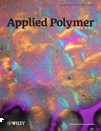
JOURNAL OF APPLIED POLYMER SCIENCE
Pioneering Discoveries in Polymer ScienceThe Journal of Applied Polymer Science, published by Wiley, is a leading journal in the field of polymer science, showcasing innovative research and applications in various domains since its inception in 1959. With an ISSN of 0021-8995 and an E-ISSN of 1097-4628, it is indexed in prominent databases, maintaining a strong presence with Scopus rankings placing it in the Q2 category across multiple disciplines, including Chemistry, Materials Chemistry, and Polymers and Plastics. The journal’s commitment to advancing scientific knowledge is reflected in its impact on the materials science community, with noteworthy rankings such as #38 in Surfaces, Coatings and Films and #51 in Polymers and Plastics. Though not an open-access publication, it remains a vital resource for researchers, professionals, and students aiming to deepen their understanding of polymer applications and to stay abreast of the latest developments in this ever-evolving field. With a focus on high-quality research, the Journal of Applied Polymer Science continues to be a cornerstone for those engaged in polymer research and its myriad applications.

Journal of Polymer & Composites
Exploring the Future of Polymer Chemistry and Engineering.Journal of Polymer & Composites, with ISSN 2321-8525 and E-ISSN 2321-2810, is an esteemed academic journal published by STM JOURNALS, dedicated to the advancement of knowledge in the rapidly evolving fields of polymer science and composite materials. The journal serves as a pivotal platform for researchers and professionals, offering cutting-edge research articles, reviews, and case studies that explore innovative developments and applications in polymer chemistry, material science, and engineering. Although currently lacking an impact factor citation, the journal aims to foster dialogue among academia and industry partners, addressing the latest trends and breakthroughs that drive the field forward. With a commitment to scholarly excellence, the Journal of Polymer & Composites is positioned as an essential resource for enhancing the understanding of polymer composites and their multifaceted applications. Notably, STM JOURNALS' reputation for quality publications underscores the journal’s importance in facilitating impactful research and educational initiatives worldwide.
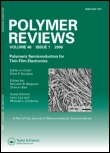
Polymer Reviews
Unveiling the complexities of polymer technology.Polymer Reviews, published by Taylor & Francis Inc, is an esteemed journal dedicated to the intricate and evolving field of polymer science. With its ISSN 1558-3724 and E-ISSN 1558-3716, the journal has established a significant presence among researchers and practitioners alike, evidenced by its impressive categorization in the Q1 quartiles across multiple disciplines, including Biomedical Engineering, Materials Chemistry, and Renewable Energy. Since its inception in 2006 and continuing through 2024, Polymer Reviews has consistently aimed to advance the knowledge base of polymer applications and innovations, providing a platform for comprehensive review articles that stimulate further research and inspire practical solutions. The journal, ranking within the top percentile across several Scopus categories, underscores its impact and relevance in a rapidly developing scientific landscape. Though not an open-access journal, it remains a vital resource for those invested in the future of materials science and engineering.
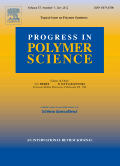
PROGRESS IN POLYMER SCIENCE
Shaping the Future of Polymers and PlasticsPROGRESS IN POLYMER SCIENCE is a prestigious academic journal published by PERGAMON-ELSEVIER SCIENCE LTD, dedicated to advancing the field of polymer science. With an ISSN of 0079-6700 and an E-ISSN of 1873-1619, this journal has established itself as a leading source of high-quality research since its inception in 1967. It ranks in the top quartile (Q1) across multiple categories including Ceramics and Composites, Materials Chemistry, Organic Chemistry, Polymers and Plastics, and Surfaces and Interfaces, reflecting its strong reputation and impact within the scientific community. The journal features rigorous peer-reviewed articles that not only contribute to theoretical advancements but also emphasize practical applications of polymer science in various industries. Although it is not an open-access journal, it remains accessible through institutional subscriptions and provides invaluable insights and data for researchers, professionals, and students alike. PROGRESS IN POLYMER SCIENCE is essential reading for anyone looking to stay abreast of the latest developments and innovations in this dynamic field.
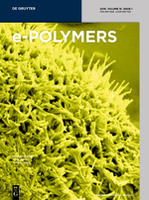
E-POLYMERS
Advancing Polymer Science for a Sustainable FutureE-Polymers, an esteemed journal published by De Gruyter Poland Sp. z o.o., serves as a vital platform for advancing knowledge in the fields of chemical engineering, polymer science, and theoretical chemistry. With its Open Access policy since 2019, researchers from around the globe can freely access and disseminate groundbreaking findings that span the convergence of diverse disciplines, making it an indispensable resource for both academia and industry. The journal is recognized for its significant impact, reflected in its Q2 ranking in Chemical Engineering, Physical and Theoretical Chemistry, and Polymers and Plastics categories in 2023. Its impressive Scopus rankings further solidify its position, showcasing a percentile rank of 70th and above across major categories. With a publication history extending from 2001 to 2024, E-Polymers continually addresses pressing challenges within the polymer research community, fostering innovation and collaboration among researchers, professionals, and students eager to contribute to the evolving landscape of materials science.
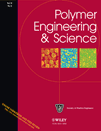
POLYMER ENGINEERING AND SCIENCE
Transforming Ideas into Polymer SolutionsPOLYMER ENGINEERING AND SCIENCE, published by WILEY, is a premier journal specializing in the field of polymer science and engineering. Since its inception in 1961, this journal has been at the forefront of disseminating high-quality research, focusing on various aspects of polymers and plastics, including their chemistry, properties, and applications. With an impressive impact factor, it ranks in the second quartile (Q2) across multiple categories, including Chemistry (Miscellaneous), Materials Chemistry, and Polymers and Plastics, showcasing the journal's significance and influence in these vital areas of research. Researchers and professionals in academia and industry will find the latest advancements and innovative methodologies in polymer science, making this journal an essential resource for those looking to stay updated on cutting-edge developments. While it does not currently support Open Access, its comprehensive scope and critical insights positioned it as a valuable platform for advancing knowledge and fostering collaboration within the polymer community. The journal’s office is located at 111 River St, Hoboken 07030-5774, NJ, United States, emphasizing its strong presence in the academic landscape.
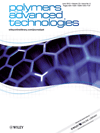
POLYMERS FOR ADVANCED TECHNOLOGIES
Unleashing Potential in Polymer Science and TechnologyPOLYMERS FOR ADVANCED TECHNOLOGIES is a premier peer-reviewed journal published by WILEY, focusing on cutting-edge research in the field of polymers and plastics. Since its inception in 1990, the journal has established itself as a critical resource for academics and industry professionals alike, reflecting advancements and innovations in polymer science and technology. With an impressive Scopus ranking of #45 out of 161 in the Materials Science category and a 72nd percentile ranking, it ranks in the Q2 quartile for its relevance and impact within the polymers field. The journal's comprehensive scope encompasses recent developments and trends in polymer applications, synthesis, and characterization, making it essential reading for researchers looking to advance their work within this dynamic area. Researchers can submit their work in the UK, where the journal is published, and while it does not currently offer open-access options, its robust impact factor highlights the significance of the research it disseminates. Join the community of experts pushing the boundaries of polymer science by engaging with POLYMERS FOR ADVANCED TECHNOLOGIES. Continuous exploration and innovation await those who contribute to and learn from the journal’s diverse array of studies.
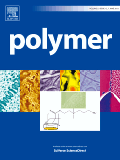
POLYMER
Transforming Ideas into Polymer SolutionsPOLYMER, an esteemed journal published by Elsevier Science Ltd, stands at the forefront of polymer science, presenting cutting-edge research that encompasses the realms of Materials Chemistry, Organic Chemistry, and Polymers and Plastics. With a remarkable impact factor reflecting its significance in the academic community, POLYMER has been a vital resource since its inception in 1960, contributing to a converged body of knowledge through to 2024. Rated Q1 in all relevant categories as of 2023, and boasting impressive Scopus rankings, this journal not only facilitates advanced discussions in polymer synthesis, characterization, and applications but also serves as a critical platform for collaborative research among scholars, professionals, and students. While it offers content primarily via subscription, POLYMER remains dedicated to fostering innovation and excellence in the field, making it an essential read for anyone passionate about polymer science.